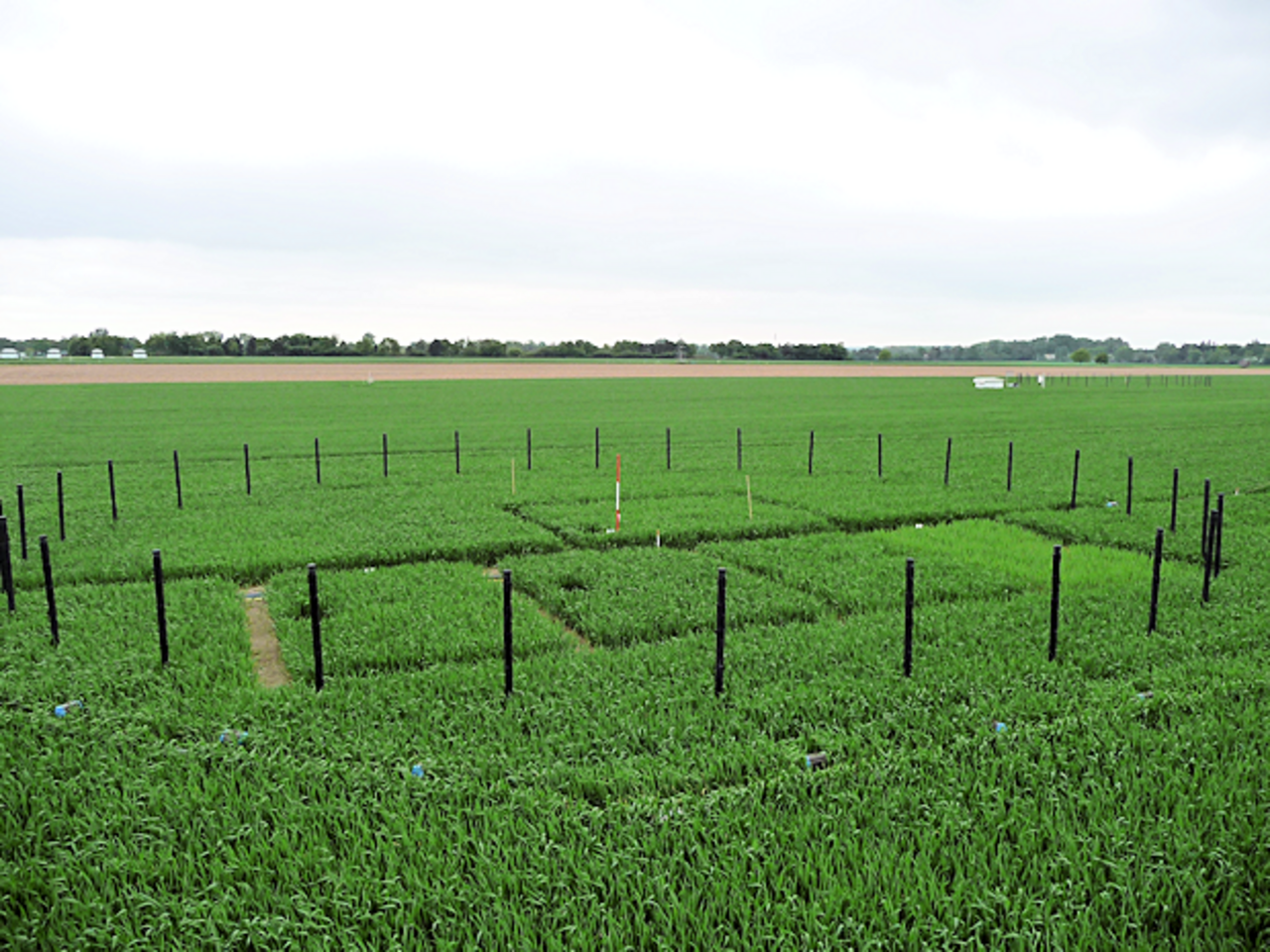Project
Effect of elevated CO2 concentrations on nitrogen uptake and remobilisation in the grain of wheat

Field experiments on processes of the interaction of nitrogen fertilisation and elevated atmospheric CO2 concentrations on concentration and composition of grain protein of wheat
As previously published, the rise of the atmospheric CO2 concentration will increase grain yield of wheat, however, grain protein content and thus grain quality will be impaired. This will be a substantial problem for food security, which has to be managed by cultivation and breeding measures.
Background and Objective
In order to solve the problem a detailed understanding of the processes is necessary, which will be worked on in this project. The effect of elevated CO2 concentration will be investigated on nitrogen uptake and remobilisation to the grain. It will be tested whether the negative effect of elevated CO2 on grain quality can be prevented by changing the amount or type of nitrogen fertilization.
It is suggested that the reduction of photorespiration under high CO2 causes a decreases of nitrate assimilation. This process and other mechanisms are thought to be responsible for the decrease of grain protein concentration under elevated CO2. The problem may be solved if the plant takes up only ammonium. This will be tested by using different forms of nitrogen fertilizer.
Approach
Winter wheat will be grown on the experimental field site of the Thünen-Institute with ambient (ca. 395 ppm) and elevated CO2 concentration (600 ppm)over two years. Nitrogen fertilisation will be an additional treatment factor by using different levels (low, medium, abundant) and types of nitrogen (only ammonium or mixture of nitrate and ammonium).
Data and Methods
The investigations comprise
- short-term analysis of the activity of nitrate reductase
- measurements of accumulation of organic nitrogen in the vegetative shoot (leaf and stem) until anthesis
- measurement of nitrogen uptake from anthesis until grain maturity
- analysis of remobilsation of shoot N to the grain
Our Research Questions
Does CO2 enrichment decrease nitrate reductase activity and thus N assimilation of the whole plant?
Is there an interaction of CO2 enrichment with nitrogen supply, i.e. does the CO2 related effect on grain nitrogen concentration decrease with increasing nitrogen supply and can the negative CO2 effect on grain nitrogen be removed by adding more fertilizer.
Can the negative effect of CO2 enrichment on grain quality be eliminated by feeding the plants with ammonium instead of nitrate?
Results
- There was no decrease but an increase of the nitrate reductase activity under elevated CO2 concentration
- Seasonal water use was decreased up to 15% under high N supply, however, there was no effect under N deficiency. Similarly, water use efficiency was more increased by CO2 enrichment under high N (>30%) than under low N (20%).
Involved external Thünen-Partners
- Julius Kühn-Institut - Bundesforschungsinstitut für Kulturpflanzen (JKI)
(Quedlinburg, Braunschweig, Groß Lüsewitz, Kleinmachnow, Deutschland) -
Universität Hohenheim
(Hohenheim, Deutschland) -
Technische Universität Braunschweig
(Braunschweig, Deutschland)
Funding Body
-
Deutsche Forschungsgemeinschaft (DFG)
(national, öffentlich)
Duration
5.2014 - 2.2019
More Information
Project funding number: MA 1736/5-1
Project status:
finished
Publications
- 0
Dier M, Sickora J, Erbs M, Weigel H-J, Zörb C, Manderscheid R (2018) Decreased wheat grain yield stimulation by free air CO2 enrichment under N deficiency is strongly related to decreased radiation use efficiency enhancement. Eur J Agron 101:38-48, DOI:10.1016/j.eja.2018.08.007
- 1
Dier M, Meinen R, Erbs M, Kollhorst L, Baillie C-K, Kaufholdt D, Kücke M, Weigel H-J, Zörb C, Hänsch R, Manderscheid R (2018) Effects of free air carbon dioxide enrichment (FACE) on nitrogen assimilation and growth of winter wheat under nitrate and ammonium fertilization. Global Change Biol 24:e40-e54, DOI:10.1111/gcb.13819
- 2
Manderscheid R, Dier M, Erbs M, Sickora J, Weigel H-J (2018) Nitrogen supply - A determinant in water use efficiency of winter wheat grown under free air CO2 enrichment. Agric Water Manag 210:70-77, DOI:10.1016/j.agwat.2018.07.034
- 3
Manderscheid R, Dier M, Erbs M, Weigel H-J (2016) Free air CO2 enrichment (FACE) increases N remobilization and N acquisition during grain filling in wheat mitigating a decrease of grain N concentration. In: FACEing the future : food production and ecosystems under a changing climate, 26. – 29. September 2016, Justus Liebig University Giessen, Germany, Book of Abstracts. p 25
- 4
Dier M, Manderscheid R, Sikora J, Erbs M, Weigel H-J (2016) Interactive effects of CO2 enrichment and N fertilization on grain N-acquisition and grain protein concentration in wheat. In: Ewert F, Boote KJ, Rötter RP, Thorburn PJ, Nendel C (eds) International Crop Modelling Symposium 15-17 march 2016, Berlin, book of abstracts. pp 240-241
- 5
Manderscheid R, Dier M, Erbs M, Weigel H-J (2016) Mehr CO2 verringert den saisonalen Wasserverbrauch von Winterweizen insbesondere bei guter Nährstoffversorgung. Mitt Gesellsch Pflanzenbauwiss 28:190-191
- 6
Dier M, Meinen R, Erbs M, Hänsch R, Weigel H-J, Zörb C, Manderscheid R (2016) Winter wheat grown under free-air CO2 enrichment (FACE) does not perform less with nitrate than ammonium based fertilization in terms of N assimilation, yield and grain protein concentration. In: Third International Symposium on the Nitrogen Nutrition of Plants, 22.-26. August 2016, Montpellier, Conference Book. p 99
- 7
Manderscheid R, Sikora J, Dier M, Erbs M, Weigel H-J (2015) Interactive effects of CO2 enrichment and N fertilization on N-acquisition, -remobilization and grain protein concentration in wheat. Proced Environ Sci 29:88, DOI:10.1016/j.proenv.2015.07.173
- 8
Dier M, Manderscheid R, Sikora J, Erbs M, Weigel H-J (2015) Prozessanalyse zur Senkung der Kornprotein-Konzentration bei Winterweizen durch CO2-Anreicherung. Mitt Gesellsch Pflanzenbauwiss 27:49-50
- 9
Erbs M, Manderscheid R, Jansen G, Seddig S, Pacholski AS, Weigel H-J (2010) Effects of free-air CO2 enrichment and nitrogen supply on grain quality parameters and elemental composition of wheat and barley grown in a crop rotation. Agric Ecosyst Environ 136(1-2):59-68, DOI:10.1016/j.agee.2009.11.009

![[Translate to English:] [Translate to English:]](/media/_processed_/4/0/csm_Titel_Ant_Plot_1c3363e3f7.png)
![[Translate to English:] [Translate to English:]](/media/_processed_/b/3/csm_Titel_93px_Ant_Plot_0ef6a20d79.png)
![[Translate to English:] Logo des Bundesministerium für Ernährung und Landwirtschaft](/media/allgemein/logos/BMEL_Logo.svg)